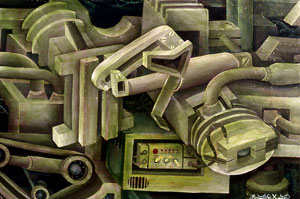 I have always had a
fascination for mechanical things. From the engine on my jeep to
the clicking latches of an old lock, parts that move perk my interest
and make me want to discover the thoughtful design beneath the utility. It surprises me that
machines do not
work their way into more of my paintings. Perhaps it is that too
much of my time is spent building, rebuilding, repairing or just
discovering some sort of instrument or device to take any joy in
painting still images of them for my walls.
I have always had a
fascination for mechanical things. From the engine on my jeep to
the clicking latches of an old lock, parts that move perk my interest
and make me want to discover the thoughtful design beneath the utility. It surprises me that
machines do not
work their way into more of my paintings. Perhaps it is that too
much of my time is spent building, rebuilding, repairing or just
discovering some sort of instrument or device to take any joy in
painting still images of them for my walls.
Truly, machines are
fantastic creations. Although created for mundane and repetitive
tasks, mechanicals exhibit extraordinary craftsmanship and careful
design. Examples at the pinnacle
of engineering show almost a magical movement, as tasks are completed
and objects created from a lifeless assemblage of materials. We
have created some amazing things...
As I paint, sometimes
I like to consider the parts in my body hiding under the skin that move as my brush moves.
The tendons in my arm are like pushrods, and the muscles behind them
pull as great hydraulic pistons. Each
part moves with both terrible force and delicate patience. How is it that I can
gently glide my brush across a canvas in one motion as if my entire arm was
one single branch, without joint or bone? A
quick glance at a medical journal or anatomy book provides a glance into
the machines that we are; wonderfully made and lovingly engineered.
As a creation, man is
both effectively simple and astoundingly complex. The heart
operates as a
pump, the skeleton is a sturdy frame, the brain a computer filled with
electrical signals and passages. The body is an
artful execution of engineering; every part important to the function of
the whole. Just as machines, we too age and fail; systems break
down and the body will cease to work. Whereas the body's perceived
simplicity comes from the understandable function of its parts; complexity comes from
the intangible. Although there is much information available to describe the utility of
the body, there is small understanding in the motivation at its center.
Unlike machines, we
are given the gift of free thought. While machines carry out a specific
task or set of instructions intended by the creator, we have little bound to a program or set
purpose. We are both the operator and instrument; given the
ability to harness this creation for good or evil. A machine has
no choice. What is it then, that allows this? Which part
holds the key to the decisions we will make? The soul is the only
item that cannot be found in the anatomy illustrations. It is the
part that cannot be described, cannot be repaired, cannot be removed.
We have created some fantastic machines, but none can compare to the
instrument God designed; having that hidden ingredient that gives us
life.
Again, I watch myself
paint. I think about the movements under my skin and am reassured
that I only need to consider them when I wish to.
